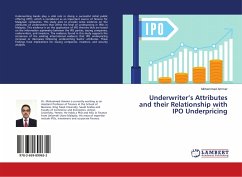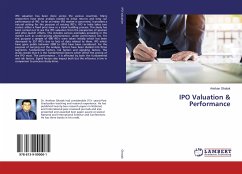Initial Public Offerings (IPOs) have been of theoretical and empirical interest to financial economists for many decades. Much of this attention can be attributed to a persistent and global financial phenomenon in the new-issues market - IPO underpricing. The work examines the role of incentive-based underwriter compensation (in form of discretionary fees) in mitigating IPO underpricing. IPO underpricing is assumed to result from asymmetric information between the firm going public and its underwriting investment bank. Thus, making the underwriter's compensation more sensitive to the issuer's valuation of the IPO should reduce conflicts of interest owing to asymmetric information and hence IPO underpricing.
Bitte wählen Sie Ihr Anliegen aus.
Rechnungen
Retourenschein anfordern
Bestellstatus
Storno








